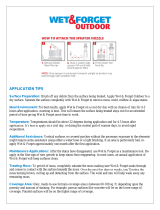Page is loading ...

MIXING RATIO
Apply Wet & Forget Outdoor with a garden sprayer. Dilute 1 part Wet & Forget Outdoor to 5 parts water.
Wet & Forget Outdoor Concentrate
Fill Garden Sprayer With Water To
2 1/2 cups (20 oz.)
1 gallon mark
5 cups (40 oz.)
2 gallon mark
TIPS
Surface Preparation: Brush off any debris from the surface being treated. Apply Wet & Forget Outdoor to a
dry surface. Saturate the surface completely with Wet & Forget to remove mold, mildew & algae stains.
Ideal Environment: For best results, apply Wet & Forget on a cool dry day with no chance of rain for 4-5
hours after application- morning is best. This will ensure the surface being treated stays wet for an extended
period of time giving Wet & Forget more time to work.
Temperature: Temperatures should be above 32 degrees during application and for 4-5 hours after
application. It’s best to apply on a cool day, or during the coolest part of warmer days, to avoid rapid
evaporation.
Additional Assistance: Vertical surfaces or covered porches without the necessary exposure to the elements
might require some assistance using either a water hose or a light brushing. If an area is particularly bad, re-
apply Wet & Forget approximately one month after the first application.
Maintenance Applications: After the stains have disappeared, use Wet & Forget as a maintenance tool. Re-
apply at the first sign of new growth to keep stains from reappearing. In most cases, an annual application of
Wet & Forget will keep surfaces clean.
Coverage Area: 43 oz. concentrate makes 2 gallons when mixed one part Wet & Forget with 5 parts water.
Coverage area is between 250-750 sq. ft. depending upon the porosity and amount of staining. For example,
porous surfaces like asphalt shingles will be on the lower range of coverage. Painted surfaces will be on the
higher range of coverage.
/










